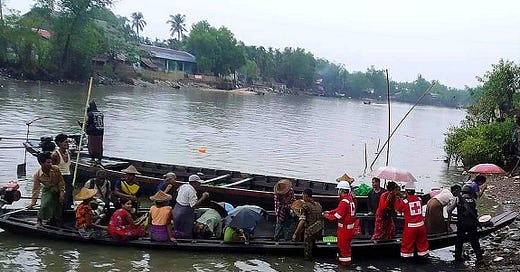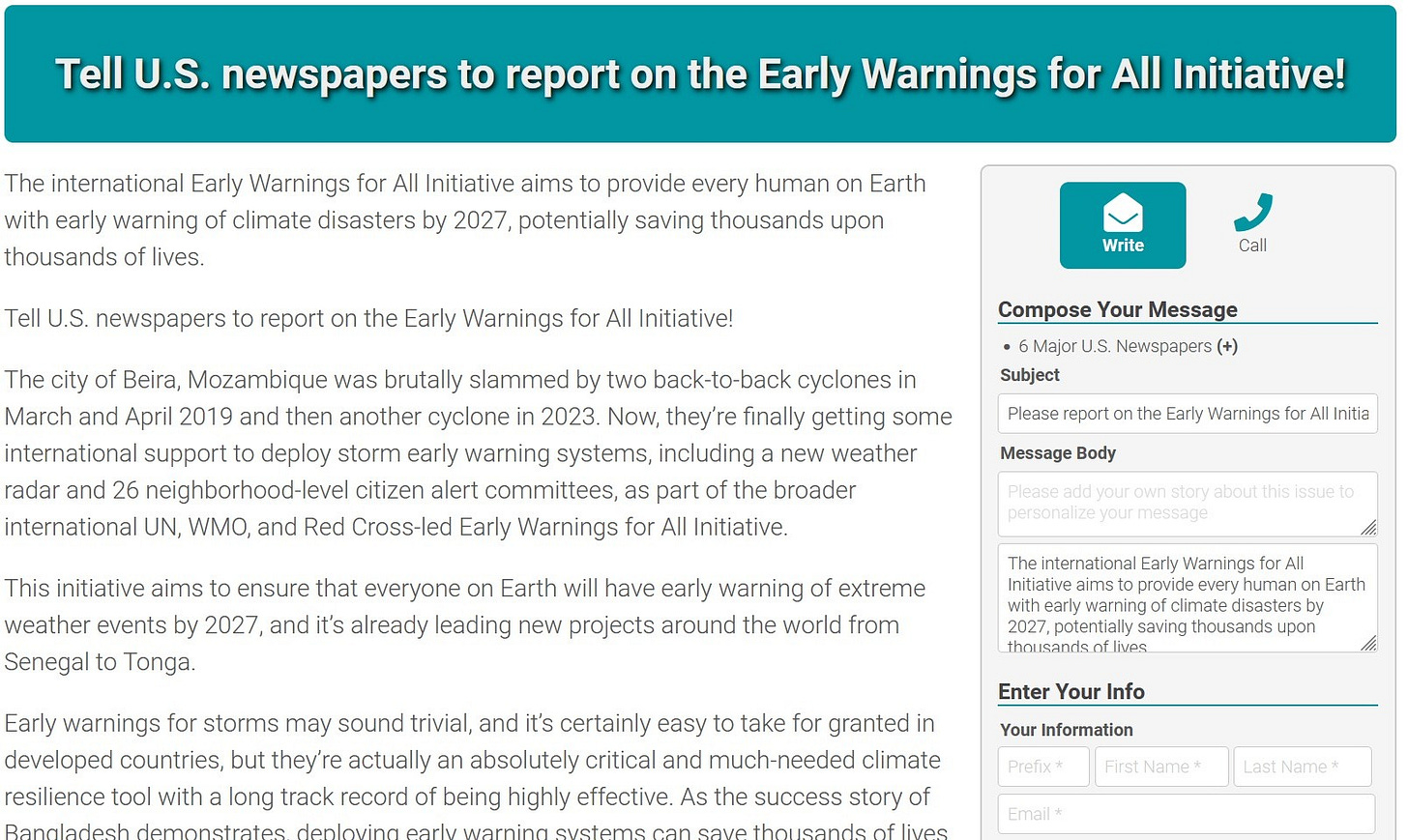The international Early Warnings for All Initiative aims to provide every human on Earth with early warning of climate disasters by 2027, potentially saving thousands upon thousands of lives.
Tell U.S. newspapers to report on the Early Warnings for All Initiative!
Touch or scan the QR code below to take today’s action in the app and earn trees!
Or take action on the Internet – no app required!
Reasons For Hope
The city of Beira, Mozambique was brutally slammed by two back-to-back cyclones in March and April 2019 and then another cyclone in 2023. Now, they’re finally getting some international support to deploy storm early warning systems, including a new weather radar and 26 neighborhood-level citizen alert committees, as part of the broader international UN, WMO, and Red Cross-led Early Warnings for All Initiative.
This initiative aims to ensure that everyone on Earth will have early warning of extreme weather events by 2027, and it’s already leading new projects around the world from Senegal to Tonga.
Early warnings for storms may sound trivial, and it’s certainly easy to take for granted in developed countries, but they’re actually an absolutely critical and much-needed climate resilience tool with a long track record of being highly effective. As the success story of Bangladesh demonstrates, deploying early warning systems can save thousands of lives even while the weather gets more extreme. Here’s some background on why this work is so vitally important:
On May 14, 2023, the climate change-supercharged Cyclone Mocha struck Bangladesh and Myanmar, but the death toll was kept surprisingly low, thanks to thousands of people’s hard work. The Associated Press reports that robust local early warning and preparedness programs “likely saved thousands of lives.” Bangladesh, which has developed a massive network of shelters and early warning systems in recent years, managed to move 700,000 people to cyclone shelters before the storm hit, in an incredible logistical feat equivalent to rapidly moving more than the entire population of Boston, Massachusetts. The death toll from Cyclone Mocha ended up topping out in the low- to mid-hundreds, (possibly less than 500) and most of those losses weren’t in well-prepared Bangladesh but in neighboring civil war-torn Myanmar.
Hundreds of deaths are of course a horrific tragedy, but placed in historical context, this is amazing progress. For comparison, when the Bhola cyclone struck Bangladesh (then East Pakistan) in 1970, at least 300,000 people died1. And Bhola was a weaker storm, Category 4-equivalent compared to the Category 5-equivalent Cyclone Mocha! When a similar Category 5 cyclone hit Bangladesh in 19912, about 138,000 people died. When Cyclone Amphan (also Category 5) hit Bangladesh in 2020, only 128 people were killed.
The same pattern is repeated all over the world, for disasters like floods, droughts, and even earthquakes as well as storms. (Check out the awesome article that’s the source of the above chart from Our World in Data). Satellites tracking weather are providing vital early warnings, more and more people have phones to receive those early warnings, economic development is making people richer and more able to protect themselves and move if necessary3 and governments, NGOs, and local communities are integrating years of lessons about how best to prepare for disasters.
The key takeaway is this: climate change is making storms, floods, and droughts stronger, but human ingenuity, technological development, and community resilience can make them less deadly. Climate disasters are awful, causing lots of economic damage4, leaving people homeless, and still causing many deaths5. But even as the atmosphere grows more turbulent, humans are already less likely to die from natural disasters than in most of recorded history. And with the Early Warnings for All Initiative, we can extend one of the most effective protections against climate disasters to cover every human on Earth.
This is vital work, progress worth fighting for, but it’s still relatively little-known.
Tell U.S. newspapers to report on the Early Warnings for All Initiative!
There's still time to get out the vote before November! Join Climate Action Now and League of Conservation Voters for a special letter-writing event on Thursday, Oct. 17 at 7:30 pm ET. We will learn about the Vote Forward platform and work on crafting messages to add a personal touch to prewritten letters.
If you can, we also recommend registering with Vote Forward by Tuesday, Oct. 15. This will allow you to adopt 5 voters and print your letters before the event. Of course, this step is optional—whether you register ahead of time or not, we encourage anyone who wants to learn more about letter-writing with Vote Forward to participate!
Back then, Bangladesh was East Pakistan. The Pakistani government’s incompetent response to Bhola was a major factor in Bangladesh declaring independence.
Weirdly, it seems to have no other name than “the 1991 Bangladesh cyclone.” Another fun fact: Operation Sea Angel, a U.S.-led multinational naval humanitarian response effort to the 1991 Bangladesh cyclone, is credited with saving 200,000 lives.
Bangladesh is a major economic development success story; the country has grown much richer in recent years.
Economic damage from disasters is actually rising as death tolls are falling, and for some of the same reasons: as countries get richer, they’re more likely to be able to get their citizens out of harm’s way, but they’re also more likely to have more valuable stuff to be destroyed.
For example, the climate change-fueled extreme drought in Somalia that likely killed 43,000 people in 2022, made worse by Somalia’s poverty and ongoing civil war.









